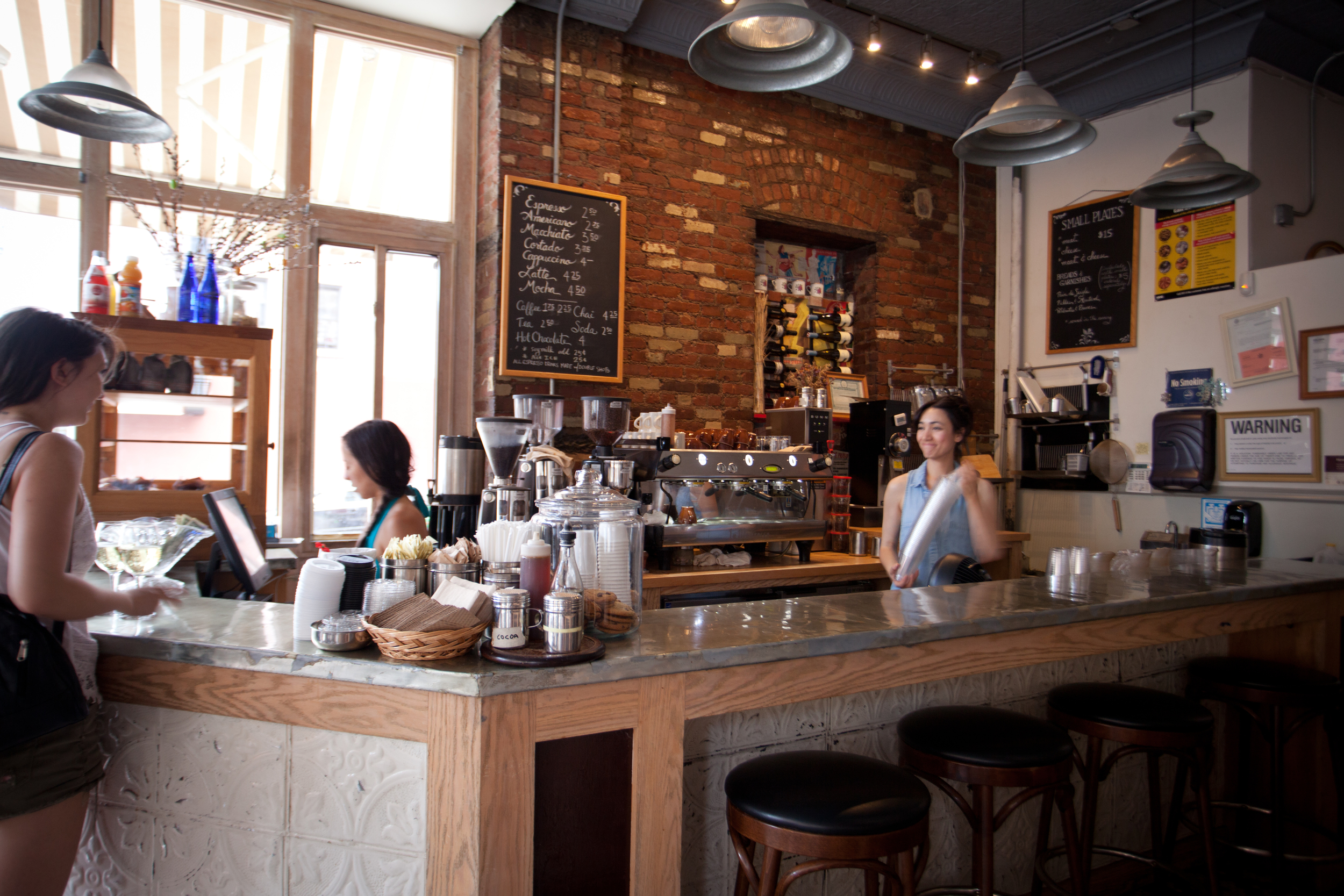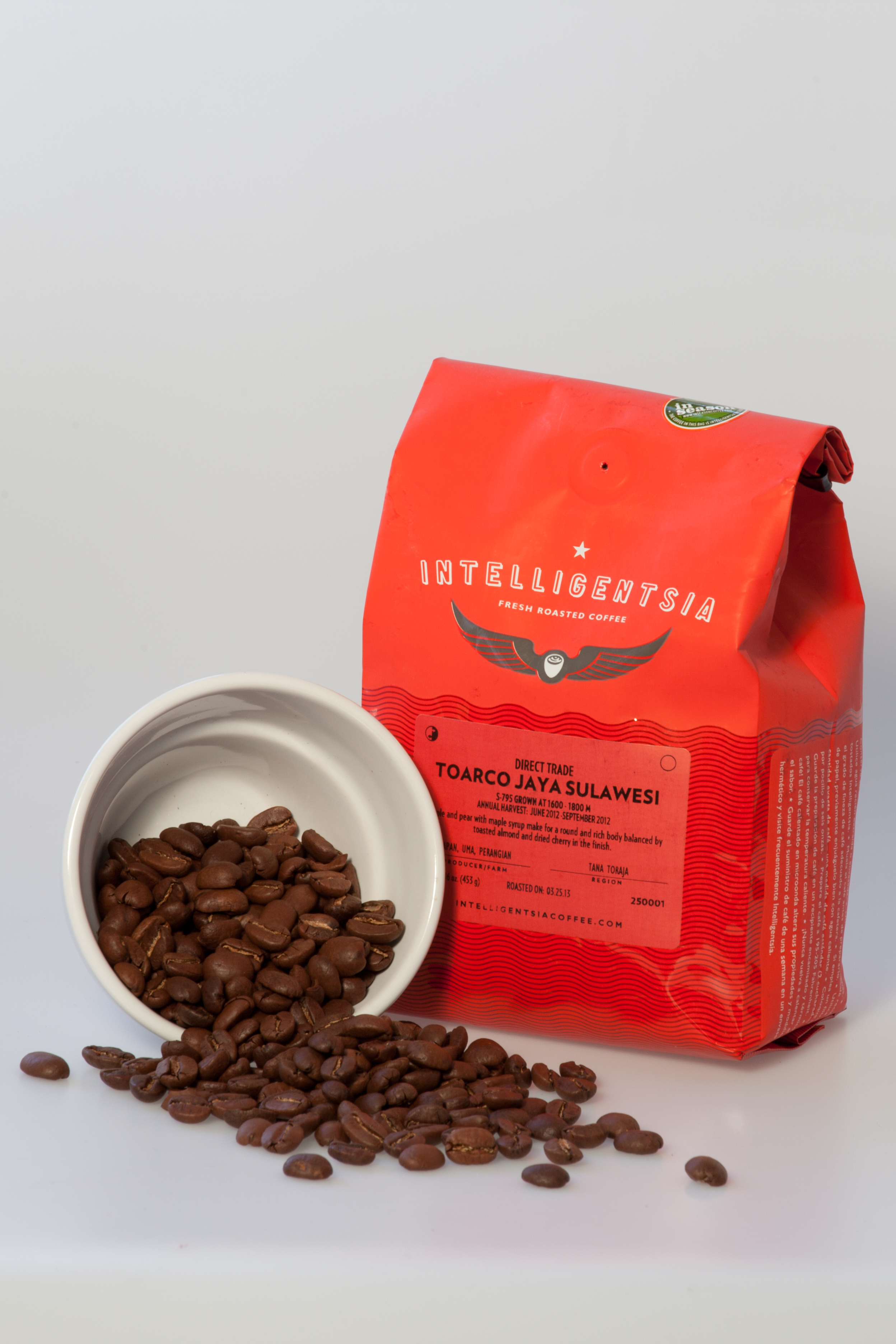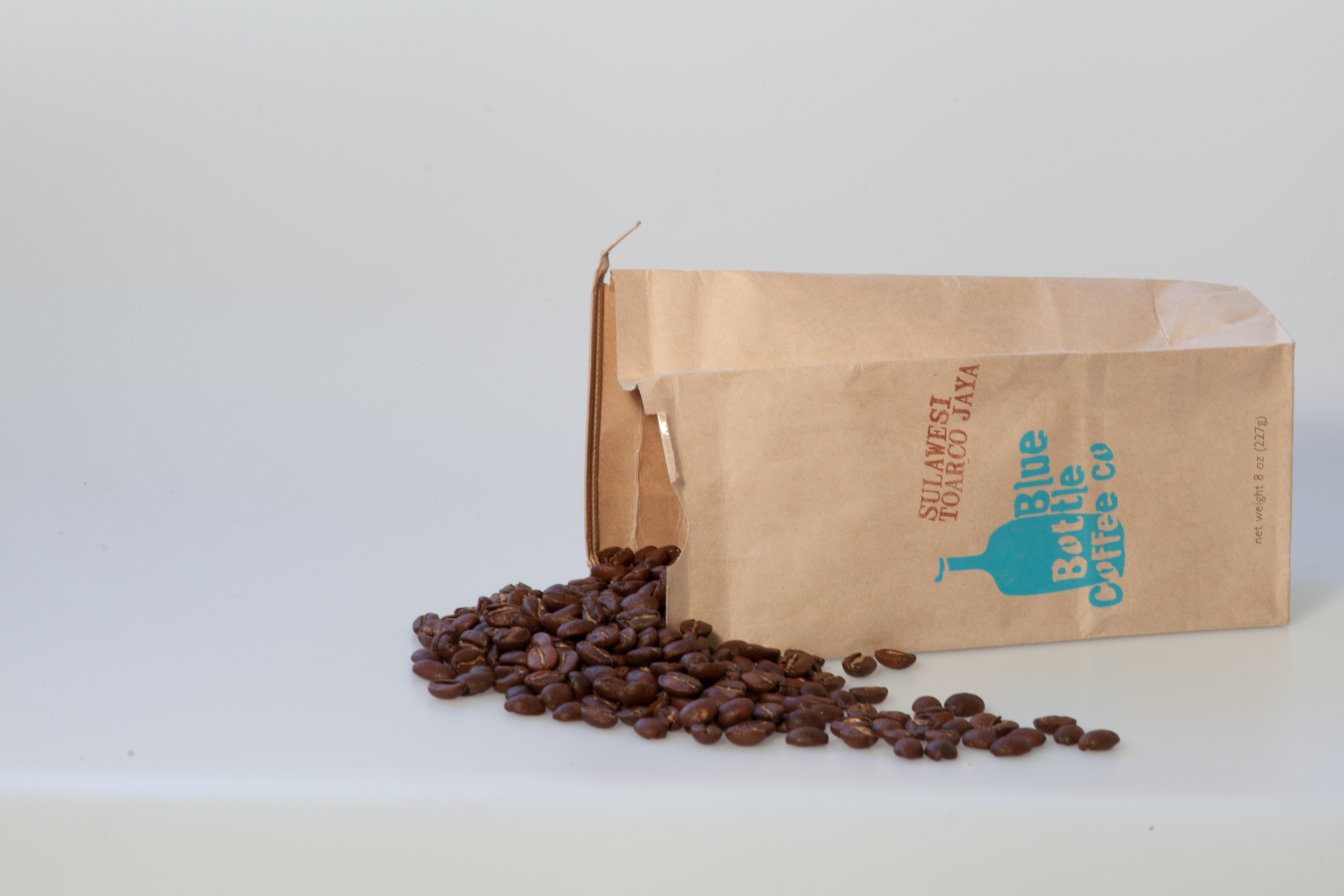Blue Bottle Coffee is one of the premium coffee roasters nationwide, and so I was lucky enough to visit one of their outposts in the Rockefeller Plaza.
The interior is very modern and simple. The only sense of color is the blue logo that can be found on just about everything.
The one in the Rockefeller doesn't have any seats, but outside of the café, there are tables and chairs. It would be a good spot to stop by after some shopping, or as a palate cap after a meal. The other locations are about 50/50 in terms of seating, so it's not necessarily a place you want to set up a meeting or grab a coffee with a friend. It's the perfect place to go in the morning for a good cup of coffee and maybe a pastry, and then get going.
They have a relatively simple menu, with options like Hot Chocolate (which is apparently very good) and Iced Coffee (although surprisingly, no cold brew?)
I ordered a Sidamo Howolso, which the barista made right in front of me. It was very flavorful and fruity, with hints of violet, hibiscus, and even canteloupe. It's so flavorful on its own that it doesn't need anything else to go with it.
The barista was explaining the process of brewing the coffee to me with such passion, that I couldn't help but be sucked in to the art of coffee making in that moment.
Blue Bottle keeps things simple, so their spots are good places to go if you don't feel like dealing with the hustle and bustle of more elaborate cafés.
Blue Bottle Coffee
1 Rockefeller Plaza Concourse Level, Suite D New York, NY 10020
450 W. 15th St. New York, NY 10014
102 Franklin Street New York, NY 10013
The High Line 10th Ave and West 16th Street New York, NY 10014
160 Berry St. Brooklyn, NY 11249
Coffee Culture - Parisian vs. American
There are some obvious differences between Paris and the US.
1. Parisians walk everywhere.
2. Red wine and water are one in the same.
3. Impeccable, instinctive fashion sense.
4. Art, style, cuisine.
5. No shave, no problem.
But a less obvious difference remains: coffee culture.
In April 2010, Oliver Strand, coffee expert, wrote an article on Paris's move towards a more American way of drinking and appreciating coffee – but only little by little. According to Strand, "beans are still old and over-roasted, the machines are still second-rate and poorly maintained, and the person behind the bar is still more concerned with continuing his or her conversation than pulling a good shot." Guess they have yet to hear of the cold brew kegerator.
Ironically, coffee is very much a part of Parisian culture. Every time I went to a café, everyone around me would be ordering a coffee, whether it was a café au lait or an espresso (insert French accent). My host mother would offer me coffee every morning, and if we were sitting down to talk, it was always over coffee (sometimes tea).
People there don't just stand in line for a Starbucks and jet out of there with a tall soy latte. They, instead, will always sit down, maybe smoke a cigarette, and drink their coffee there. But that doesn't necessarily mean they are drinking good coffee. In fact, many American coffee lovers will visit and complain about how terrible the coffee is there.
According to another article on the way Parisians drink their coffee, it seems that Parisians drink coffee as more of a palate cleanser or for just a burst of energy than for its taste. But recently, things have started to change.
Over here on our side of the Atlantic, people have become so obsessed with good coffee that the number of different methods – from cold brew to pour-over – are growing exponentially, along with the importance of good coffee equipment, technology, and fresh, quality beans.
Perhaps Paris will experience the same evolution. Strand did follow up in 2012 announcing that "Finally, Paris has a coffee scene." Or considering the Parisians' inclination to preserve the French culture, maybe they will continue to just keep coffee simple.
I'm sure all coffee beans are juvenile. They're always getting grounded!
Cold Brew Kegerators
Cold brew coffee on tap, in your office. Joyride's cold brew kegerators are the new "water cooler". Some of the world's most innovative companies now enjoy a cold brew keg in their office, serving iced coffee on tap through their cold brew kegerators. Joyride is a leader in distributing cold brew kegs to offices and cafes.
Café Review – OST Café
This summer, Joyride will be assembling an interactive map that functions as a café guide. I'm Kristen Lee, the Social Media Intern, and I'll be visiting cafes throughout NYC and getting a taste of the wonderful beans the Big Apple has to offer. For my first stop, I went to OST Café in the East Village. I walked in and found myself in a modest, naturally-lit, unassuming setting. To the left is the coffee bar and directly in front is a full wet bar. There are a few large, leather booths, a few scattered tables and stools along the bars. It's not a setting for a huge gathering, but it's mellow enough for a nice hangout with a friend or two.
I ordered a latte. It was exactly what anybody would ever want out of a latte - just smooth, creamy, and milky enough that I still taste the comforting, clean coffee. They also use some great beans, including some from our very own Intelligentsia.
They have a relatively simple menu, with classic café drinks, but they also have a heartier menu with cheeses and charcuterie. Between the menu and the Parisian paintings on the walls, the cafe has a distinctly European feel. OST is right on the corner of 12th and A, so it would be perfect for people watching through the window if it gets too cold or too hot to be sitting outside. I feel like it would be a nice place to go around late afternoon or evening, more so than the morning, perhaps to grab a coffee and maybe a drink or two as twilight hits.
OST Café 441 E. 12th St. (Between Ave A and 1st St.)
Coffee by: Intelligentsia
The Year of Sulawesi: A Renaissance in Indonesian Coffee
Indonesian coffees have long been considered earthy, and frequently flawed. Not anymore thanks to the Toarco Company.
This year, for the first time, I've had an Indonesia that I liked enough to purchase it for personal consumption. Our roasters agree. Blue Bottle, Stumptown and Intelligentsia have all released coffees from the Island Sulawesi, sourced by the Toarco Company of Japan. These coffees are sweet and bright in a way that I have never seen in an Indonesian coffee. For a long time these lots were snatched up by the Japanese market. This year, however, they've made their way to America and I'm damn happy they have. These coffees differ from traditional Indonesians in a number of ways, and well take a look at those differences.
The Toarco Company
This company has been operating on the island since 1976 and has a business model very reminiscent of Third-wave roasters. Indonesia's coffee crops are largely grown by small holders, owning on average only 1,200 trees. Because of this dispersion of control, quality is difficult to monitor and education difficult to disseminate. The Toarco company has created a model plantation, where they educate farmers on proper husbandry, picking, and processing of coffee. Farmers are welcome to come and learn how to properly operate their own farms more professionally, leading to fewer flaws in the resultant cup. To reward better practices, the company uses a strict pay-for-performance model, rewarding the most successful farmers with the highest prices. All the coffees purchased by the Toarco company are cupped three times during their evolution from cherry to green bean and are judged based on quality of cup, size of beans and number of defects. They will purchase coffee only from farmers and collectors who agree to adhere to their uniquely strict sourcing, picking and processing requirements.
The Terroir and Varietals
Coffee was first brought to Indonesia via India by the Dutch East India company in the early 1700s. Coffee was, at that time, a new and popular drink among wealth bourgeoisie and royalty, with prices as high as $300/lb (adjusted for inflation). The plants brought to Indonesia were of the Typica varietal and were from East African stock. These early plants are considered a 'noble' varietal, that is to say, they are damn tasty. Over time, most of these trees were replaced by Robusto and and the arabic hybrid Catimor - both of which have higher yields and are less susceptible to leaf rust (such as the rust that is currently ravaging Colombia). Unfortunately, they are also not as tasty. Due to the rural nature of Sulawesi, those changes never took place and thus, you can still find the original Typica, as well as another great varietal, S-795, all throughout the region. To help maintain these varietals, the Toarco company gives away free seedlings grown on its model estate, Pedamaran. In doing so they are ensuring that these lower yielding, but better tasting varietals continue to thrive in the face of the pressures of globalization and access to alternative, hardier trees.
The Processing
Most Indonesia coffees are processed using the wet-hull method: while the beans are still not fully dried, they are bought to market, where they are purchased, damp, by a middle man. Due to the difficulty of transportation and storage in rural and humid Sulawesi, the typical transportation to well established facilities that we see in Africa and Latin America is damn near impossible for these small-holding farmers. The Toarco company has mitigated this difficulty and in doing so allowed for a better, if more expensive processing system, by setting up rural coffee purchasing stations where the farmers can bring their crops. These are then aggregated and dried fully in their parchment before shipping out. The result is that most of the fruit-like brightness and acidity survives the processing in way that it can't survive wet-hull processing. This difference alone has a drastic impact on the cup, yielding notes that I've never had before in Indonesian coffees.
With an understanding of the background, lets take a look at the specific offerings. They come from slightly different lots but they are all syrupy, fruity and absolutely worth buying if you can get your hands on them.
Intelligentsia Toarco Jaya Sulawsi Region- Tana Toraja Varietal- S-795 Elevation- 1600-1800masl Processing- Wet Processing Cup- Apple and pear with maple syrup make for a round and rich body balanced by toasted almond and dried cherry in the finish. Retail Price- $20/12oz
Stumptown Indonesia Sulawesi Toarco Toraja Region- Toraja, Sulawesi Varietal- S-795, Typica Elevation- 1400-1800masl Processing- Washed Process Cup- Sweet and juicy notes of red currant and plum coat your palate in a cup with the taste and texture of molasses. Retail Price-$16.50/12oz
Blue Bottle Sulawesi Toarco Jaya Region- Tana Toraja, Sulawesi, Indonesia Varietal- S-795/Jember, Typica Processing- Wet-processed Elevation- 1450-1600masl Cup- Huge, sweet body with much more complexity than your typical Indonesian Retail Price- $13.89/12oz
Having tried all three of these coffees, it is immediately apparent that they aren't from the same lot. Those small differences in elevation and origin have lead to three different, yet good cups. The blue bottle is full-bodied and juicy without leaning toward a muddled cup, while, on the other end of the spectrum, the intelligentsia is surprisingly nuanced for such a chewy cup. The Stumptown falls somewhere in the middle, but maintains an attractive sweetness. These coffees bring to mind some of the sweeter Ethiopians I've had, although their body is significantly fuller. This style of coffee is unlike any I've had before. If this is the direction Indonesian coffees production is moving, then I for one welcome the change.
Preferred Brew Method: These coffees make a killer cup that comes out as even fuller and richer when prepared on the french press.
Joyride gets La Colombe Samples
We had a sit down with La Colombe at while back, and they were kind enough to send us a huge number of samples.
These are just a few of them. La Colombe is a Philly based operation that has been around since 1994. They predate what is typically considered the "third-wave" of coffee and their model is different.
In terms of coffee, La Colombe has a two-tiered system. On the bottom they have their wildly popular blends, most of which have ethical accreditation. On the top, they have their answer to the Stumptowns, Intellegensias and Counter Cultures: The Workshop Series. These coffees focus on the origins of the coffees to a greater degree, and like the blends, have ethical accreditations (organic, fair trade, shade-grown etc). While the blends tend to be roasted quite darkly, these single-origins focus more on the lighter-side of La Colombe. They even have a robusto single-origin (sacrilege, I know). Finally, they sent us "Coffee Caramel" which is kind of like if coffee and nutella had a love-child with the most dangerous qualities of both. And like nutela, I've been eating it with a spoon in quantities far too great for my health. And like coffee, if you do that at 8pm you'll be up all night.
If you have a chance, I recommend checking out their cafe on Lafayette. The ambiance is great and the baristas well trained.
-Adam
Coffee Porter - A Killer Combo
While doing some Thanksgiving shopping at Fairway, I came across this coffee-beer and couldn't resist giving it a try.
It's called "Alta Gracia Coffee Porter" and is brewed by Wolaver's using coffee originating in the Dominican Republic and roasted by Vermont Coffee Company.
While I'm usually a purist in both my beer and coffee tastes, I have to admit this hybrid was quite delightful. The presence of coffee is immediately apparent in the aroma. On the palate, its contribution comes through the chocolatey undertone it imparts to this Vermont porter.
Surprising tasty, Wolaver's Coffee Porter leads me to wonder what other successful coffee-beer combinations could be possible; perhaps an African coffee used to enhance a wheat beer. Imagine a Blue Moon, where the citrus is not from an orange peel, but rather a dry processed Yirgacheffe.
Finally, in gather the links for this post, I learned that Wolaver's is brewed in Middlebury, Vermot, home to my (David) Alma mater, Middlebury College. I'm liking this beer and this brewery even more now. And even more after learning that Middlebury Spanish Professor, Julia Alvarez is the founder of this community supporting coffee farm. According to the Vermont Coffee Company, which has been importing from this farm for nine years, "All the proceeds of the Alta Gracia coffee sales are returned to the community through the fair trade prices we pay, the support we [The Vermont Coffee Company] provide for a community literacy program and teacher, and our donations that fund a sustainable agriculture volunteer."
See below for more info on the brewery and the beer or click here for a page dedicated this Vermont Coffee Company/Wolaver's collaboration, which according to the former's website "is the result of a fantastic collaboration of farmer, roaster, and brewer – all with strong Vermont ties."
Wolaver's Fine Organic Ales: About: 100% Organic Hops and Malts Mission: Our brewery is dedicated to brewing great tasting beers, supporting sustainable agriculture, and minimizing our impact on the environment. Company Overview: Brewers of the nation's first certified organic beers.
Wolaver's Alta Gracia Coffee Porter: Alta Gracia Coffee Porter 5% Wolaver’s Alta Gracia™ Coffee Porter is made in cooperation with the Vermont Coffee Company using 100% certified fair trade, organic coffee from the Alta Gracia farm in the Dominican Republic. Alta Gracia™ Coffee Porter is an exceptionally smooth and flavorfully complex beer that is surprisingly true to the porter style. hint of vanilla brings out the sweetness of the dark-roasted Dominican coffee.






















